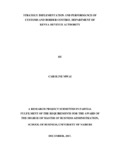| dc.contributor.author | Mwai, Caroline | |
| dc.date.accessioned | 2018-02-06T12:52:55Z | |
| dc.date.available | 2018-02-06T12:52:55Z | |
| dc.date.issued | 2017 | |
| dc.identifier.uri | http://hdl.handle.net/11295/103362 | |
| dc.description | A research project submitted in partial fulfilment of the requirements for the award of the degree of master of business administration, school of business, university of Nairobi | en_US |
| dc.description.abstract | Successful strategy implementation requires a lot of attention from both the top management and the rest of the employees. Organizational performance is largely dependent on strategic measures chosen and the implementation process. The success or failure of any strategy depends on how well the implementation process was managed. Many organizations are faced not with the challenge of formulation but that of implementation. C&BC department has strategic measures as outline in the KRA sixth corporate plan some of which are underway. It is for this reason the there is need to investigate strategy implementation and performance at the department. Project teams responsible for implementation of strategies have a responsibility to ensure that the process is adequately monitored and evaluated to completion and the. The topic of study was strategy implementation and performance of C&BC department of KRA and the objective was to establish the relationship between strategy implementation and performance at the Customs and Border Control Department of KRA. This is a case study of Customs department of KRA. The study targeted seven (7) respondents who included the Commissioner of Customs and all the six Deputy Commissioners in charge of the different customs regions as outlined in the organization chart. Primary data was collected through the use of an interview guide. Content analysis was used to analyze the data collected. The study found out that successful strategy implementation requires a combination of administrative factors which include; communication, ICT and automation, organization structure and culture, the right leadership, employee and stakeholder involvement among many others. These factors directly influence strategy implementation. The key findings of this study revealed that the above factors have led to increased revenue collection and compliance to customs requirements and laws. The above factors are a measure of organizational performance. The study recommends the need to provide coordination on how strategy is implemented in the various business units of C&BC and that KRA should employ a world class state of technology in line with its automation plan. The limitation is that the results of the analysis cannot be generalized or inferred to other departments within KRA or other organizations. Recommendations for further study were that the research should be replicated in similar parastatals in order to find out the influence of strategy implementation on performance. It was also suggested that there is need to investigate how specific projects such as RECTS, ACMS and cargo scanners have influenced performance of the department. | en_US |
| dc.language.iso | en | en_US |
| dc.publisher | University of Nairobi | en_US |
| dc.rights | Attribution-NonCommercial-NoDerivs 3.0 United States | * |
| dc.rights.uri | http://creativecommons.org/licenses/by-nc-nd/3.0/us/ | * |
| dc.title | Strategy Implementation and Performance of Customs and Border Control Department of Kenya Revenue Authority | en_US |
| dc.type | Thesis | en_US |



